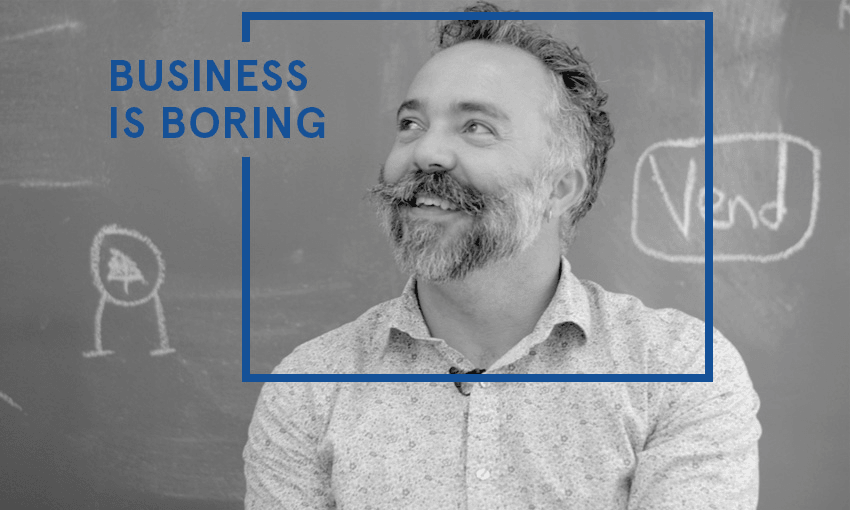Business is Boring is a weekly podcast series presented by The Spinoff in association with Callaghan Innovation. Host Simon Pound speaks with innovators and commentators focused on the future of New Zealand, with the interview available as both audio and a transcribed excerpt. This week Simon chats with Vaughan Rowsell about turning big ideas into big realities.
Vend has come up many times over the last 100 episodes. It’s really the reason I’m doing this podcast, as it was there I came to really love all the elements of business.
Because it was a very special place. From the values – don’t be a dick, just fucking do it – through to the fact it was like a family and one hell of a ride, the fastest growing tech company in the country with the ups and downs that entails… it all started with founder Vaughan Rowsell. It wasn’t his first rodeo, but we’ll get to that.
He is well known for his amazing yearly challenges, like riding around the world, giving up beer, running 1000 kms – you might have seen the Ted X talk. And recently he’s also been getting more involved at both ends of the industry with work as deputy chair of the Hi-Tech Trust, helping pull together the great theme on diversity at this year’s awards, and he also co-founded OMG Tech, the programme that gives underrepresented kids access to the most interesting tools of the future.
He’s also a mate. I’ve been lucky to get to know him across a few years and see what he does up close and it is the exact same thing he does in public. So it is a great pleasure to have Vaughan Rowsell on the show this week.
Either download this episode (right click and save), have a listen below or via Spotify, subscribe through iTunes (RSS feed) or read on for a transcribed excerpt.
There was a new tool out when you started Vend, called the iPad. It turned out to be the first Point of Sale software on an iPad. That’s an amazing thing. Google’s only a dozen years in change and the iPad is only about eight years old. It’s remarkable how recent these things are.
It was really good timing. The number one piece of advice I give to a lot of young entrepreneurs with great ideas is that the biggest challenge ahead of you is getting the timing right – because you may have the best idea but if the market’s not ready for it then it could be a long cold winter whilst you’re waiting for the market to catch up. Inversely, you’re too late and someone else has beaten you to it.
Once you get the idea and get the timing right then it’s execute, execute, execute. Go as fast as you can. There was a definite element of luck with us. We were the first to do the cloud-based retail platform, quickly followed by many many others once we proved it could be done.
Then the iPad came along. The way we’d built it meant that it was really trivial for us to pull it all over to the iPad so we were able to claim that title of being the first POS on iPad.
And at that moment it exploded. So all these people all around the world were setting up coffee stores and shops and thinking ‘I wish there was a nicer way of doing this’, then googling ‘iPad POS software’ and Vend was the number one.
That’s the crazy thing. I speak to retailers and they say ‘we had been waiting many many years for you to come along, this was an idea that we hoped existed years before you did it’. Admittedly these were probably more sort of the early adopter growth hacker type retailers. Younger retailers who were just starting out. They used Gmail, they used Xero, they used other ideas that were just starting out and it just made perfect sense that their Point of Sale should be online as well.
We were incredibly lucky with timing and we executed really well and we had a great marketing team and we told a great story and built an interesting brand around what we were doing and we weren’t trying to compete with the boring blue POS systems, we wanted to embrace our kiwi heritage, even though we weren’t inherently Kiwi in our approach. Our values, the stuff that got us up in the morning, and we wanted to have fun. We wanted to make sure that when our retailers discovered us that was all apparent. We were real people.
We wanted to make sure that retailers felt there were other people on the other side of the internet, that it wasn’t just computers or an engineer who was sitting somewhere in a basement who’d written some cool software. That there was a passionate team behind it who really cared about retail. We had a lot of fun.


